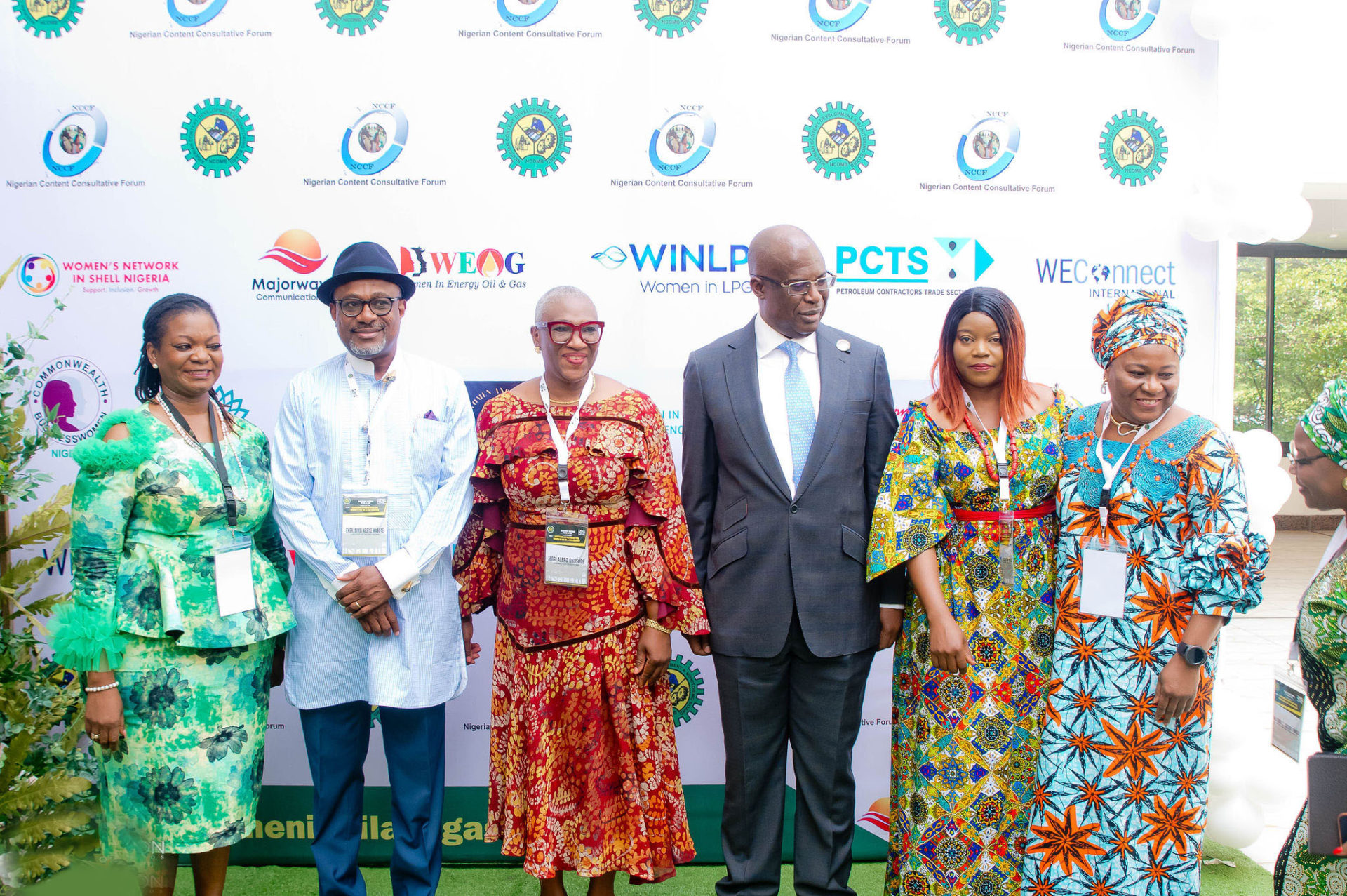Energy
NCDMB To Set Minimum Benchmark for Women in Oil and Gas…to begin disbursement of $40m Women Fund

Modupe ASUDO
ABUJA-THE Nigerian Content Development and Monitoring Board (NCDMB) has announced plans to set a minimum percentage of females that must be included in any human capacity development (HCD) programme or any other initiative that it will approve for the Nigerian Oil and Gas Industry.
The Executive Secretary of NCDMB, Engr. Simbi Kesiye Wabote, stated this on Tuesday at the 2nd Nigerian Women in Oil and Gas Conference. He said the Board would work on the policy and communicate it to the industry as soon as possible.
The conference was organised by the NCDMB in partnership with the Diversity Sectorial Working Group of the Nigerian Content Consultative Forum (NCCF), which was set up by the NCDMB to advise it on policy directions.
Speaking on the $40m Women in Energy Fund which the NCDMB set up in partnership with the Nigerian Export-Import Bank (NEXIM Bank), the Executive Secretary indicated that 15 applications have been received and three have been approved and disbursement of funds would soon start. He added that the online portal for the fund was launched two weeks ago, and this would speed up and reduce human interface in the application and processing.
He commended the performance of women in various roles in the oil and gas industry and canvassed for their inclusion in the administration of the various Trusts and Funds that were established by the Petroleum Industry Act (PIA) 2021, notably the Host Community Development Trust, Host Community Development Trust Fund and Environmental Remediation Fund.
Speaking further, the NCDMB boss confirmed that the Oil and Gas Industrial Parks in Bayelsa State and Cross River state are getting ready for completion and will commence operations next year. He noted that the Board had started inviting applicants for allocation of plots to set up manufacturing outfits in the park and encouraged women-owned businesses with workable proposals to apply as they will be given special consideration as part of the Board’s commitment to mainstream women into the oil and gas industry.
Providing an update on the administration of the Women in Energy Fund, the Managing Director of NEXIM Bank, Mr. Abba Bello explained that applicants would need to meet set criteria before they can access the fund. “It is a loan and not a grant and applicants have to meet the conditions, so we can achieve the intended purpose,” he said. Represented by the Head Specialised Products at the Bank, Mr. Mohammed Aumiz, the NEXIM Bank boss explained that it takes only 22 days for an application to be processed and an offer letter issued if the company met the criteria.
Earlier in his remarks, the Minister of State for Petroleum Resources, Chief Timipre Sylva commended the NCDMB for inaugurating the Diversity Sectorial Working Group under the NCCF as provided in Section 58 of the Nigerian Oil and Gas Industry Content Development (NOGICD) Act. He noted that women make up 48 percent of the global labour force, but they only account for 22 percent of the labour force in the oil and gas sector.
Quoting a recent study by Global Energy Talent Index, the Minister said women occupy about 50 percent of non-technical positions at entry-level compared to only 15 percent of technical and field role positions, hinting that gender diversity and inclusion decreases with seniority, with only a tiny proportion of women in executive positions. “The percentage of women in the industry drops from 36 percent to 24 percent between the middle and executive level,” he noted.
He confirmed that the Nigerian government has been deliberate in introducing gender-friendly policies aimed at increasing access to funding, award of contracts and support for research and development in the interest of women operators in the Nigerian oil and gas industry.
The Minister harped on the need to be deliberate in getting more girls into Science Technology Engineering and Mathematics (STEM), which is a pathway to careers in the oil and gas industry.
He also advised women in the Nigerian Oil and Gas industry to work together towards increasing participation of fellow women in the industry by engendering growth, building capacities and capabilities, identifying opportunities, mentoring and coaching.
In her goodwill message, the Chairperson NNPC Board, Senator Margery Chuba-Okadigbo challenged the NCDMB to institute a development programme like the Project 100 for oil and gas firms owned by women. She said the implementation of the Petroleum Industry Act (PIA) provides a good opportunity to mainstream more women in oil and gas activities. She also recommended formal mentorship and role modelling for younger women coming up in the oil and gas industry.
Energy
NLNG Improves Nigeria’s Domestic LPG Supply Operational Efficiency

In line with its continuous improvement culture, the Nigeria LNG Limited (NLNG) will be working closely with its stakeholders to improve operational efficiency in its domestic Liquefied Petroleum Gas (DLPG) supply in Nigeria.
According to a statement from its General Manager, External Relations and Sustainable Development, Sophia Horsfall, this was highlighted at an engagement session with stakeholders in Lagos.
It was gathered that the NLNG plans to enhance engagement and improve operational efficiency of its LPG supply through digitalisation of some of its processes which include a new platform designed to streamline regulatory processes, optimise risk management, and enhance the buyer experience. The platform will feature IT-supported relationship management, automated issue resolution, centralised real-time payments, and improved case management systems, ensuring a seamless supply process despite market shifts and external pressures.
ALSO READ: Ifon-Ilobu Crisis: Adeleke Assures Of Quick Restoration Of Peace
Manager, Commercial Contract Management, NLNG, Tolulope Longe, reiterated that the planned improvements will enable and consolidate NLNG’s resolve to delivering 100% of its LPG supply to the Nigerian market.
She said a strategic roadmap was in play to ensure the achievement of NLNG’s longstanding goals of LPG being accessible and available in the country, aligning with its vision of being a globally competitive energy company, improving lives sustainably. She also harped on the significance of these improvement initiatives and the Company’s push for LPG utilisation as a clean energy source alternative to kerosene and other fossil fuels
Longe noted that the Company remained focused on growth and sustainability of the LPG market by continuously enhancing its supply processes in collaboration with offtakers. She stressed NLNG’s commitment to collaborating with stakeholders to maintain pricing stability and long-term market viability. While acknowledging industry concerns, she noted the importance of operational efficiency in meeting market demands.
NLNG aims to strengthen stakeholder engagement and improve market efficiency in the LPG sector through enhanced customer interactions, minimised schedule disruptions, timely confirmations and deliveries, and prioritisation of customers with demonstrable capacity. As it adapts to market realities, NLNG remains committed to driving sustainability and delivering lasting value to Nigerians.
Energy
Savannah Energy Completes SIPEC Acquisition

In line with its announcement of 19 March 2024, Savannah Energy has completed the acquisition of Sinopec International Petroleum Exploration and Production Company Nigeria Limited (SIPEC).
Making the revelation, an elated Chief Executive Officer, Savannah Energy, Andrew Knott, said, “We are delighted to announce the completion of the SIPEC Acquisition – the achievement of one of our core business priorities for 2025. Our focus at the Stubb Creek Field will now turn to progressing the expansion project, which we expect to increase production by almost three quarters over the course of 2025/26. I look forward to updating shareholders on this in the coming months, as well as on the progress we make towards achieving the other core business priorities we outlined to shareholders earlier this month.”
He expressed gratitude to the Nigerian government for making the acquisition possible, having required several levels of regulatory approvals.
ALSO READ: Tinubu Plans 10,000 Electric Vehicles For North-East
“I would like to thank the Government of Nigeria for the support that they have shown our Company in approving the SIPEC Acquisition and I extend a warm welcome to the SIPEC employees joining Savannah today,” he added.
Biztellers reports that the SIPEC’s principal asset is the 49% non-operated interest in the Stubb Creek oil & gas field (“Stubb Creek Field”), which is operated and 51% owned by Universal Energy Resources Limited (a Savannah affiliate company).
The SIPEC Acquisition increases Savannah’s Reserves and Resources base by approximately 30% from 151 MMboe to 197 MMboe. It adds 227 Bscf of 2C gross gas Resources at Stubb Creek Field, securing significant additional long-term feedstock gas available for sale to Accugas customers.
It was gathered that the transaction consideration was fully funded through a drawdown under a US$60 million Reserve-Based Lending debt facility arranged by The Standard Bank of South Africa Limited. At completion the cumulative consideration paid was approximately US$35.1 million (inclusive of approximately US$19.5 million of cash available to SIPEC), with US$2 million in deferred cash consideration payable in eight quarterly installments post-completion.
Savannah now intends to commence an up to 18-month expansion programme, which is anticipated to increase Stubb Creek Field gross production from an average of 2.7 Kbopd in 2024 to approximately 4.7 Kbopd.
Stubb Creek Field, located in Akwa Ibom State, Nigeria, is a producing oil field with considerable undeveloped, non-associated 2C gas resources. As at year-end 2024, Stubb Creek Field had an estimated 11 MMstb of 2P gross oil Reserves and 515 Bscf of 2C gross gas Resources1.
Commercial oil production started at Stubb Creek Field in 2015, with cumulative production of 8.1 MMstb to 31 December 2024. Oil produced at Stubb Creek Field is processed through production facilities onsite and then exported to the Qua Iboe terminal via a 25 km pipeline.
The Stubb Creek Field was converted to a 20-year petroleum mining lease in accordance with the Petroleum Industry Act 2021 and effective from 1 December 2023.
Energy
Shell On Place Of Infrastructure In Developing Nigeria’s Gas resources
Shell has called for the development of infrastructure to promote the growth of domestic gas and monetisation of the resource.
At a panel session at the just concluded Nigeria International Energy Summit (NIES) in Abuja, Managing Director Shell Nigeria Gas (SNG) Ralph Gbobo, said, “The infrastructure will support the delivery of gas from producers to consumers in an efficient way that is also transparent and cost effective.”
Ralph described infrastructure as the bedrock of a thriving gas industry, citing the Escravos – Lagos Pipeline System (ELPS) which feeds the domestic gas market as an example. He said: “If we can fully implement our regulations, a key one being the Network Code and maintain a stable Network where investors can get their returns, I can guarantee that we will see more players come into this space.”
ALSO READ: Shell Exhibition Delivers Value At Energy Summit
SNG which was established in 1988 has led the way in the provision of gas infrastructure in Nigeria, building gas distribution systems in Rivers, Abia and Ogun states through which it delivers gas to over 140 domestic, industrial and commercial customers. Last year, the company signed an agreement with the Oyo State Government to build a gas distribution infrastructure with the intention of delivering gas to businesses in the state and beyond.
Ralph explained: “Our experience at SNG shows that the task of expanding the Nigerian domestic gas market is a collective responsibility and not to be done by just a few players. It requires inputs from the regulatory, upstream, midstream and downstream sectors. The key to unlocking all these inputs is driving and implementing the right polices. The implementation of clear policies and incentives, allows for more investors to come into the domestic gas market be it in terms of gas production or infrastructural development. Investors need to be assured of a stable regulatory and fiscal market where their investments are guaranteed.”
He added: “Shell Companies in Nigeria have invested across the entire value chain of gas — Upstream, Midstream and Downstream having understood the potential of the commodity to accelerate industrial and economic growth in Nigeria.”
























